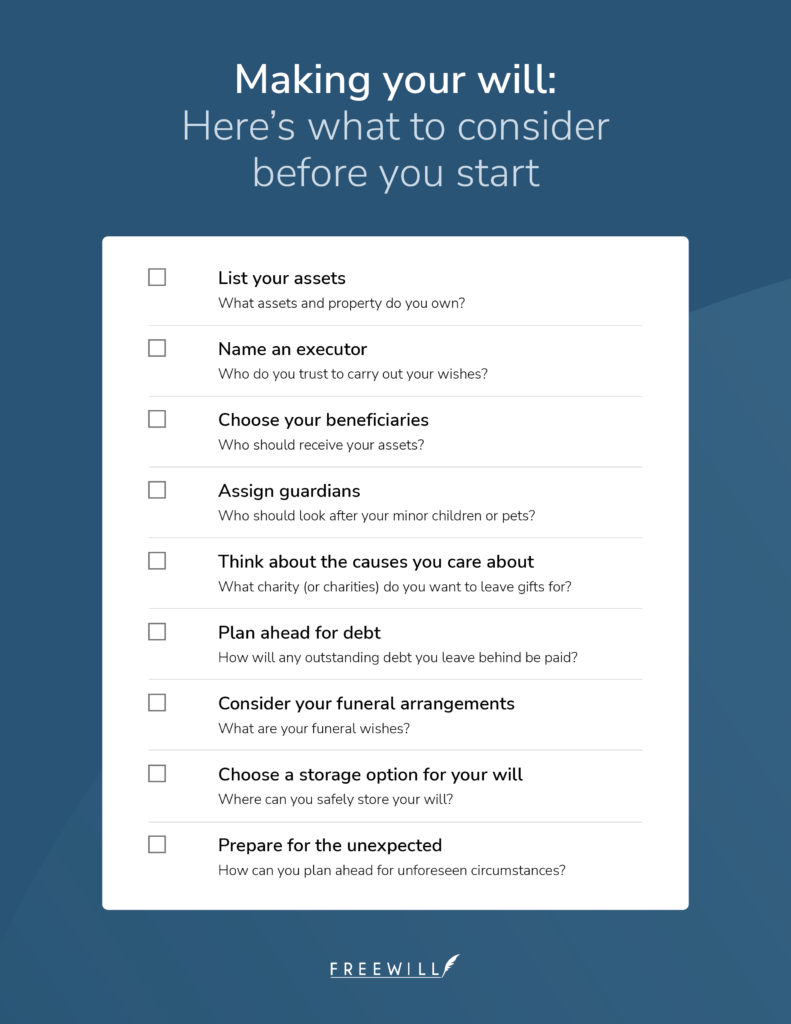The time has come: you’re ready to make your last will and testament. But as you sit down and start the process, you may realize you have more questions than answers:
“Should my partner or my sister be my executor? Wait, what’s an executor again?”
“What if I forget to include something important I own, like my car or my coin collection?”
“I can’t forget Fido! Wait…can I include my four-legged friend in my will?”
There are a lot of important decisions to make when creating a will, and it can feel a bit overwhelming at first. But the act of creating a will is a meaningful and empowering experience for many. By making your will, you’re taking control of your legacy and ensuring the people, pets, and causes you love are cared for after you’re gone.
We’ve put together a list of nine questions you can ask yourself to jump-start the will-making process.

What to think about before making your will
While these can vary based on your personal circumstances, you’ll generally want to consider the following before making your will:
1. What assets and property do you own?
Before you make a will, it’s helpful to take stock of what you own. Creating an inventory of every asset or piece of property you have will help you decide how each item should be distributed after you’re gone.
Your list should include:
- Real estate property
- Bank accounts
- Investment accounts (like stocks or bonds)
- Digital assets (including cryptocurrency)
- Vehicles (like cars, boats, or RVs)
- Personal property (like heirlooms, jewelry, collectibles, or artwork)
- Pets (they may feel like family, but they’re considered property under the law)
- Life insurance policies
- Retirement accounts
It may take time to list everything you own — and that’s okay! It’s easier to spend extra time to remember and document everything now, than realize you’ve forgotten something important later.
Consider writing your list by hand or creating a spreadsheet and keeping it with your other estate-planning documents. This can serve as a useful resource for your executor when it comes time for them to locate and inventory your assets.
Probate vs. non-probate assets
It’s important to catalog all of your assets, but not every asset should be included in your will. When it comes to estate planning, assets are broken down into two categories: probate assets and non-probate assets.
Probate is the court-supervised process of distributing your estate according to your will. While some assets must go through the probate process before they can be distributed to your beneficiaries, other assets can bypass probate and be transferred directly to your beneficiaries after you die. These are known as non-probate assets.
Because they aren’t subject to probate, non-probate assets shouldn’t be included in your will — in fact, including them can cause delays and confusion during the probate process. Instead, you need to fill out separate beneficiary designation forms for each non-probate asset you own.
Learn more about designating beneficiaries for your non-probate assets.
Non-probate assets include:
- Retirement accounts (like 401(k) and IRA accounts)
- Life insurance policies
- Payable on death (POD) accounts
- Transferable on death (TOD) accounts
- Certain bank or brokerage accounts
2. Who will be your executor?
An executor is the person you name in your will to carry out your wishes after you pass away. They’ll be responsible for contacting your loved ones, distributing your assets according to your will, and making sure any outstanding debt you left behind is paid.
In most cases, you can nominate anyone you’d like, as long as they’re a legal adult and of sound mind. You’ll want to choose someone who’s organized, reliable, and that you trust to act in the best interest of you and your loved ones. Many people choose their spouse, an adult child, or another trusted family member or friend as their executor.
Because being an executor is a big responsibility, you’ll want to talk to your nominees before including them in your will. Make sure they’re willing to serve and that they understand your wishes and how you want your estate handled. It’s also a smart idea to list a backup executor in case your first choice declines or is unable to serve.
If you plan to choose a loved one as your executor, remember that they’ll likely be mourning your passing when the time comes to begin their executor duties. It can be helpful to have an open and honest conversation with your loved ones to see if they’re willing to manage your estate during what will likely be a difficult time.
3. Who do you want to receive your property?
Once you make a list of all your assets, it’s time to decide who should receive each of them. The people you choose to receive your assets or benefit from your estate after you die are called your beneficiaries. You can choose anyone you want to be a beneficiary. Most people choose the people closest to them — like their spouse, children, parents, or close friends — or a charitable cause or organization they care about.
While it may seem easier to not tell anyone who your beneficiaries are, you could be doing your loved ones a disservice. Clearly stating who is getting what from your estate before you pass away can help avoid hurt feelings or family disagreements down the road. It can also help you learn what possessions are most meaningful to each person in your life.
For example, maybe you’re considering giving your daughter the necklace you wore on your wedding day. When you speak with your family, however, you learn that your granddaughter is interested in wearing it at her own wedding. By opening the discussion with your loved ones, you can discover new ways to create special moments for those dearest to you after you’re gone.
4. Who do you want to care for your children or pets?
You don’t want just anyone to care for your kids if something happens to you. That’s why choosing a legal guardian for your minor children is one of the most important decisions you can include in your estate plan. This person will be responsible for all aspects of your children’s care, including providing them with food, shelter, education, and love.
Becoming a guardian is a huge responsibility, so it’s important to have an open and honest discussion with the person or people you’re considering. Make sure they’re willing and able to take on the role, and that they understand your hopes and expectations for your child’s care. You can also leave money for your chosen guardian in your will, to offset the cost of adding a child or children to their household.
If you have pets, you can make sure that these furry, scaled, or feathered family members are cared for by including a pet clause in your will and naming a pet guardian.

5. What causes do you care about?
Many people don’t realize you can donate to a nonprofit in your will, but you can — and it’s a great way to give back.
In fact, leaving a charitable gift in your estate plan is an easy and meaningful way to support the causes that matter most to you. All you have to do is decide what to donate and name your favorite charity as a beneficiary — it’s that simple!
While many people opt to give cash, you can also donate non-cash assets to a nonprofit, such as:
- Investment assets (like stocks or bonds)
- Digital assets (including cryptocurrency)
- Real estate (including your house or any commercial property)
- Personal property (like artwork or a car)
To ensure your gift is transferred to the correct nonprofit, be sure to include the charity’s full legal name, address, and Employer Identification Number (EIN).
6. How will your outstanding debts be paid?
Many people live with some form of debt, and these debts aren’t erased when we die. Before your estate funds can be distributed to your beneficiaries, they’re used to cover any outstanding debt you left behind. This can include debt from:
- Credit cards
- Mortgages
- Car loans
- Private student loans
- Business loans
- Medical bills
If there aren’t enough funds to clear your debts, some of your assets may need to be sold. In your will, you can prepare for this situation by listing which assets you want sold first in the event you die with debt. This could be your house, a car, or even a collectible item.
By planning ahead, you can ensure that meaningful assets you want to leave behind for your loved ones aren’t sold.
Going the extra mile: Additional considerations for your will
7. What are your funeral wishes?
It may seem strange, but making your own funeral arrangements can greatly benefit the people you care about. By including funeral instructions in your estate plan, your loved ones can focus on coping with their grief and celebrating your life, rather than be burdened with making decisions around your funeral.
Your instructions can include:
- Where you’d like to be laid to rest
- If you’d prefer to be buried or cremated
- What type of service you’d like
- Who you want to carry out your funeral wishes
- Any charities you’d like supported in your memory
- Any other special requests, like the music you want played or the flowers you want displayed
Funeral instructions aren’t considered legally-binding documents like your will, but it’s still a good idea to have them and store them with your other estate-planning documents. With FreeWill’s free will-making tool, you can include your funeral preferences as part of the will-making process.
8. Where should you store your will?
Once you’ve created your will, you’ll want to store it in a safe place with your other estate-planning documents. Some popular storage options include:
- A waterproof, fireproof box or safe
- A safe deposit box
- With your local probate court
- With your executor
- With your attorney
It’s important to let someone know where your will and other important documents are stored. If you don’t and your loved ones can’t find it, they may assume you didn’t have a will — known as dying intestate. When this happens, the courts decide what happens to your estate. You can ensure your wishes are known and met by informing your executor, spouse, adult children, or any other trusted loved one about your will and where it’s kept.
9. How can you plan for the unexpected?
Life is full of twists and turns. It’s impossible to account for all the unexpected things that may happen in your life (or after it), but there are a couple things you can include in your plan to help you prepare.
For example, you should:
- Choose a backup executor, in case your chosen executor passes away before you or is unable to serve
- Choose a digital executor alongside your will executor, in case managing your digital assets requires special skills or understanding
- Choose secondary beneficiaries for each of your assets, in case your primary beneficiary passes away before you
- Consider what you want to happen if you face a health challenge, like being diagnosed with cancer or developing Alzheimer’s disease
Experts recommend reviewing your will every three to five years and updating as needed. You should also revise your will whenever a major life change happens, like if you get married, buy a house or have a child. Changes to your will can be made by making a codicil, rewriting your documents, or working with an estate planning attorney. And if you use an online will-maker like FreeWill, you can easily update your will and reprint your documents at any time, always for free.
Protect the ones you love by planning ahead
Having a will ensures your final wishes are known and your loved ones are provided and cared for after you’re gone. There are a lot of important decisions to make when creating your will, which can sometimes feel overwhelming — but planning ahead can help.
Before you make your will, take time to reflect on the things you own, the people you care about, and the legacy you want to leave behind. Having a clear picture of what you want to accomplish can simplify the will-making process. You can download this helpful checklist to make sure you have everything you need before making your will.
When you’re ready, FreeWill’s free will-making tool can guide you through the entire process in only 20 minutes. Just fill out the questionnaire, and your answers will be populated into a final document that you can print, sign, and execute to make it legally-binding.
Make your free estate plan today

Make your free advance healthcare directive

Make your free durable power of attorney

Make a stock donation today

Make your free revocable living trust









